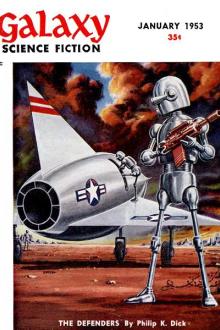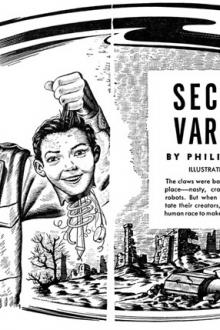Short Fiction Philip K. Dick (primary phonics books .txt) 📖

- Author: Philip K. Dick
Book online «Short Fiction Philip K. Dick (primary phonics books .txt) 📖». Author Philip K. Dick
“What do you suppose they want?” the young man said to the girl. “It’s hard to figure Martians out, isn’t it? First they give the ship clearance, let us take off, and now they radio us to set down again. By the way, my name’s Thacher, Bob Thacher. Since we’re going to be here awhile—”
The port lock opened. Talking ceased abruptly, as everyone turned. A black-clad Martian official, a Province Leiter, stood framed against the bleak sunlight, staring around the ship. Behind him a handful of Martian soldiers stood waiting, their guns ready.
“This will not take long,” the Leiter said, stepping into the ship, the soldiers following him. “You will be allowed to continue your trip shortly.”
An audible sigh of relief went through the passengers.
“Look at him,” the girl whispered to Thacher. “How I hate those black uniforms!”
“He’s just a Provincial Leiter,” Thacher said. “Don’t worry.”
The Leiter stood for a moment, his hands on his hips, looking around at them without expression. “I have ordered your ship grounded so that an inspection can be made of all persons aboard,” he said. “You Terrans are the last to leave our planet. Most of you are ordinary and harmless—I am not interested in you. I am interested in finding three saboteurs, three Terrans, two men and a woman, who have committed an incredible act of destruction and violence. They are said to have fled to this ship.”
Murmurs of surprise and indignation broke out on all sides. The Leiter motioned the soldiers to follow him up the aisle.
“Two hours ago a Martian city was destroyed. Nothing remains, only a depression in the sand where the city was. The city and all its people have completely vanished. An entire city destroyed in a second! Mars will never rest until the saboteurs are captured. And we know they are aboard this ship.”
“It’s impossible,” the heavyset business man said. “There aren’t any saboteurs here.”
“We’ll begin with you,” the Leiter said to him, stepping up beside the man’s seat. One of the soldiers passed the Leiter a square metal box. “This will soon tell us if you’re speaking the truth. Stand up. Get on your feet.”
The man rose slowly, flushing. “See here—”
“Are you involved in the destruction of the city? Answer!”
The man swallowed angrily. “I know nothing about any destruction of any city. And furthermore—”
“He is telling the truth,” the metal box said tonelessly.
“Next person.” The Leiter moved down the aisle.
A thin, bald-headed man stood up nervously. “No, sir,” he said. “I don’t know a thing about it.”
“He is telling the truth,” the box affirmed.
“Next person! Stand up!”
One person after another stood, answered, and sat down again in relief. At last there were only a few people left who had not been questioned. The Leiter paused, studying them intently.
“Only five left. The three must be among you. We have narrowed it down.” His hand moved to his belt. Something flashed, a rod of pale fire. He raised the rod, pointing it steadily at the five people. “All right, the first one of you. What do you know about this destruction? Are you involved with the destruction of our city?”
“No, not at all,” the man murmured.
“Yes, he’s telling the truth,” the box intoned.
“Next!”
“Nothing—I know nothing. I had nothing to do with it.”
“True,” the box said.
The ship was silent. Three people remained, a middle-aged man and his wife and their son, a boy of about twelve. They stood in the corner, staring white-faced at the Leiter, at the rod in his dark fingers.
“It must be you,” the Leiter grated, moving toward them. The Martian soldiers raised their guns. “It must be you. You there, the boy. What do you know about the destruction of our city? Answer!”
The boy shook his head. “Nothing,” he whispered.
The box was silent for a moment. “He is telling the truth,” it said reluctantly.
“Next!”
“Nothing,” the woman muttered. “Nothing.”
“The truth.”
“Next!”
“I had nothing to do with blowing up your city,” the man said. “You’re wasting your time.”
“It is the truth,” the box said.
For a long time the Leiter stood, toying with his rod. At last he pushed it back in his belt and signalled the soldiers toward the exit lock.
“You may proceed on your trip,” he said. He walked after the soldiers. At the hatch he stopped, looking back at the passengers, his face grim. “You may go—But Mars will not allow her enemies to escape. The three saboteurs will be caught, I promise you.” He rubbed his dark jaw thoughtfully. “It is strange. I was certain they were on this ship.”
Again he looked coldly around at the Terrans.
“Perhaps I was wrong. All right, proceed! But remember: the three will be caught, even if it takes endless years. Mars will catch them and punish them! I swear it!”
For a long time no one spoke. The ship lumbered through space again, its jets firing evenly, calmly, moving the passengers toward their own planet, toward home. Behind them Deimos and the red ball that was Mars dropped farther and farther away each moment, disappearing and fading into the distance.
A sigh of relief passed through the passengers. “What a lot of hot air that was,” one grumbled.
“Barbarians!” a woman said.
A few of them stood up, moving out into the aisle, toward the lounge and the cocktail bar. Beside Thacher the girl got to her feet, pulling her jacket around her shoulders.
“Pardon me,” she said, stepping past him.
“Going to the bar?” Thacher said. “Mind if I come along?”
“I suppose not.”
They followed the others into the lounge, walking together up the aisle. “You know,” Thacher said, “I don’t even know your name, yet.”
“My name is Mara Gordon.”
“Mara? That’s a nice name. What part of Terra are you from? North America? New York?”
“I’ve been in New York,” Mara said. “New York is very lovely.” She





Comments (0)